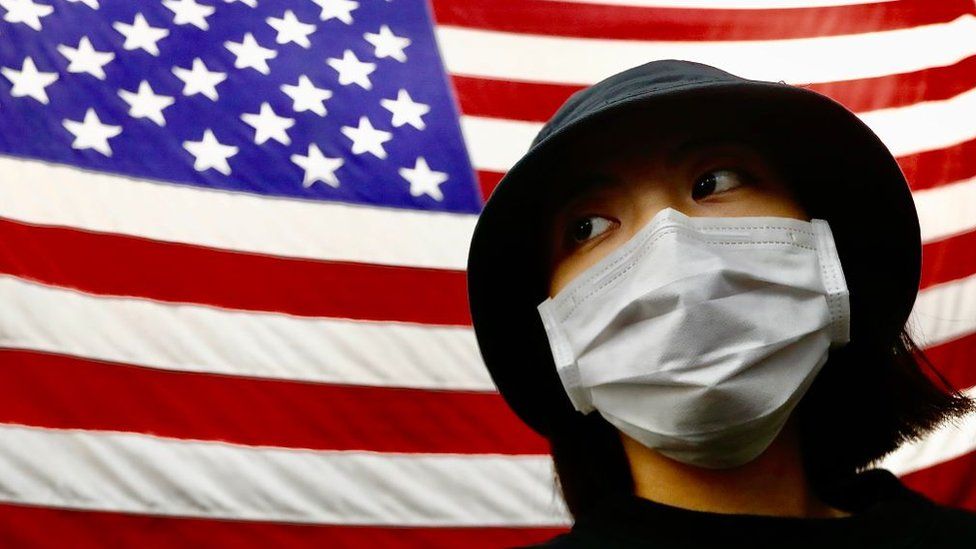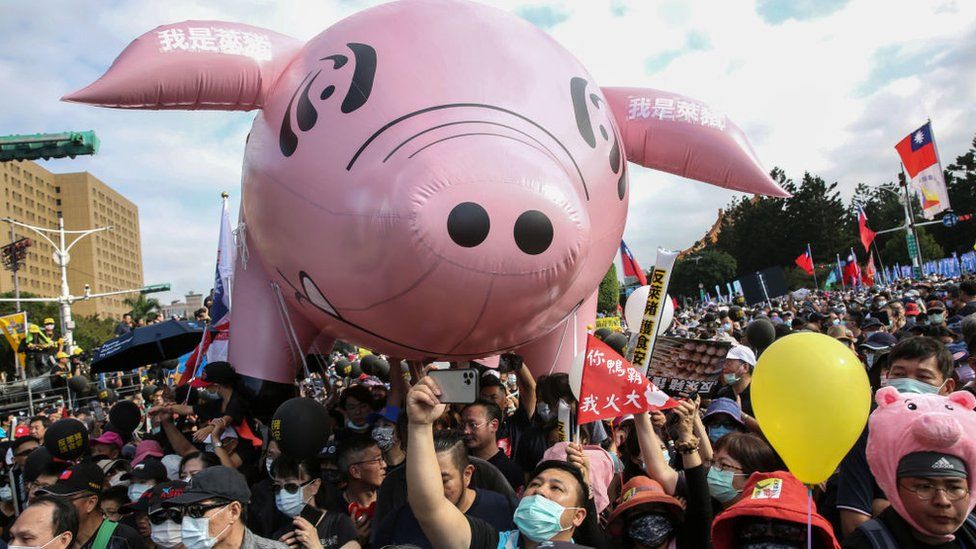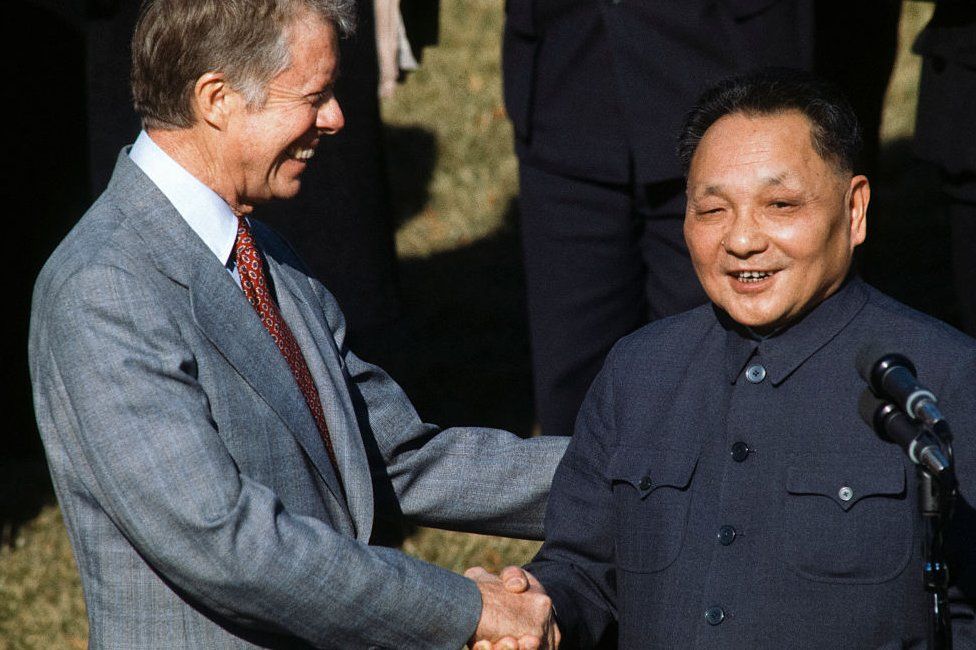Tessa Wong

The weeks-old claim followed another: the Taiwanese government was secretly harvesting blood from citizens and giving it to the US to make a bioweapon to attack China.
Both were swiftly debunked.
But this is a narrative that has been blooming in Taiwan ahead of Saturday's presidential and legislative elections.
"Yimeilun" or US scepticism, questions the faithfulness of Taiwan's biggest ally, portraying the island as a pawn exploited by America. Its ultimate goal, say analysts, is to drive a wedge between Taiwan and the US - and push the Taiwanese into the welcoming arms of China.
"There seems to be this narrative that the US will not support Taiwan, or will abandon it if there's a war, or the situation is not advantageous to the US," said Kuang-shun Yang, a disinformation researcher who coined the term in 2018.
Disinformation experts say China has a hand in spreading this message, and may even be creating it. Their evidence also points to Taiwanese close to Beijing.
It's not always conspiracy theories - most of the time it's a highlighting of news that shows the US in a bad light, or points to it as an untrustworthy superpower.
"For China, this is a battle for public opinion," said Puma Shen, a Taiwanese expert in Chinese disinformation and Democratic Progressive Party's legislature nominee.
"To persuade everyone that China is the better country is more difficult, but to persuade everyone that America is problematic is relatively easier… to China that would be considered a success."
When Taiwanese chip giant TSMC expanded in the US, it was described as American coercion and a "hollowing out" of Taiwan's resources. And the US' arms sale to Taiwan was deemed as "cheating" the island of its money by sending it unreliable weapons.
These were among 84 types of US scepticism narratives discovered by think tank IORG between 2021 and 2023 on Chinese-language media outlets, social media, online forum PTT and messaging platform LINE.
Chinese provincial governments' propaganda departments and state media outlets amplified these narratives and in some cases were even the first-known sources.
But most of the sources were Taiwanese politicians and media organisations friendly to China. There has long been suspicion of Chinese state influence and a 2019 Reuters report found evidence of mainland officials paying Taiwanese outlets for coverage.
The bioweapons rumour first surfaced in an unsubstantiated Taiwanese newspaper report which some suggested involved Beijing.
The US pork rumour began with online posts claiming, with no evidence, that the government was secretly passing off US pork as Taiwanese. Weeks later, others made the claim about poisonous US pork products that was traced to an old debunked report by a pro-China Hong Kong newspaper.

Fears about US pork triggered protests in Taiwan in the past
The idea that US pork could be unsafe has dogged discussions in Taiwan for years.
But it has returned right in time for what appears to be a tight presidential race. Mr Shen estimates that any disinformation campaign would only need to convince about 3% of voters to affect the outcome of the election.
In the lead-up to the last election, in 2020, Taiwan saw a massive wave of anti-DPP disinformation that was believed to have come from China. Though it eventually failed - President Tsai Ing-wen won her second term by a landslide - it deeply alarmed many Taiwanese.
But the political landscape has since changed. For one, tensions with China have spiked - Beijing has repeatedly reinforced unification as a goal, offering peace while not ruling out the use of force.
And two, faith in the US is dwindling.
Polls show the Taiwanese public still trusts the US far more than China. But the annual American Portrait survey conducted by Taiwanese academics found that last year only 34% of Taiwanese believe the US is a trustworthy country, compared to 45% in 2021.
Another survey by the Taiwanese Public Opinion Foundation found that 51% of Taiwanese in their early 20s identify with US scepticism narratives, the highest among all age groups.
The polling organisation said one possible reason was because younger Taiwanese were more likely to be sent to the frontlines of any possible war.
Most of this could be chalked up to America's own actions. The disastrous troop withdrawal from Afghanistan, and a divided Congress' reluctance to continue funding Ukraine in its war, have contributed to Taiwanese fears that America would abandon it or fail to intervene if China attacks, say analysts.

Anti-US disinformation has begun proliferating in Taiwan as the election draws closer
In 2021 Jaw Shaw-kong, the Kuomintang's vice-presidential candidate who has called for closer ties with China and promoted US scepticism, warned that "if Taiwan does not want to become a second Afghanistan, then it has to think clearly if it wants war or peace".
US scepticism has also played a role in "seeding" doubt, said Chihhao Yu, the author of the IORG study. "And then when the US makes a mistake, it would confirm previous suspicions."
Orphan mentality
Like other propaganda and disinformation, US scepticism too thrives on fear, whether it is about food safety or the threat of war.
But it also mines something fundamental in the Taiwanese psyche: a decades-long insecurity about their relationship with America.
This stems from Taiwan's "orphan mentality", Mr Yang said. "Taiwan was a colony of many empires, transferred again and again by its previous rulers. That historical perspective has always resided in the collective memory.
"But the most direct trigger was in 1979."
That was the year the US stunned the world and dismayed Taiwan when it formalised diplomatic relations with China after months of secret negotiations. By switching recognition from Taipei to Beijing, the US severed official ties with the island.
But it also passed a law stating it must help Taiwan defend itself. To this day it maintains close informal relations with the island and sells it arms.
But the diplomatic break-up planted the notion "that Taiwan could be abandoned by the US again", Mr Yang said. Such was the depth of hurt that it spawned a hit 1980s Taiwanese song called Orphan of Asia - it speaks of an "orphan crying in the wind" as "the Western wind sings a sad song in the East".

President Jimmy Carter with Chinese leader Deng Xiaoping in 1979 after the two sides normalised relations
This is why US scepticism often works in tandem with pro-China narratives as "push and pull forces" - encouraging Taiwan to engage more with China to guarantee peace, Mr Yang added.
"If Taiwan is an orphan, then it should be a prodigal son coming home to the great nation [of China], rather than remain as the subsidiary of the US."
American reassurances are the best antidotes to US scepticism, say analysts.
"If our ally can be more aware of the dangers of US scepticism and come out to reiterate the good aspects of our partnership… people would see that this [relationship] is good for us," Mr Yu said.
"China does this all the time, they talk about all the benefits Taiwan gets from China. But you don't see it that much in US policy messaging."
The island has bolstered its anti-disinformation defences with public education campaigns, reporting hotlines, and even AI chatbots that point out fake news.
Taiwan's parliament also mulled anti-disinformation laws, though this sparked concerns of curbs on press freedom.
But Taiwan is already estimated to be the most targeted place in the world for false information spread by foreign governments.
Years of propaganda and disinformation have polarised society and created greater distrust of facts, according to Wei-ping Li, a researcher with anti-disinformation group Taiwan Factcheck Center.
"The problem is not so much the disinformation, it's people's attitude to information now… they will ask, can you even trust this? They will make a judgment about the credibility of the information based on their party affiliation or political views," she said.
As Taiwan gets better at defending itself, so will China get better at influencing discourse with more sophisticated methods, Mr Shen warned.
Constant warnings from Taiwan's government about the dangers of Chinese influence, combined with Beijing's efforts at stigmatising criticism of China, has resulted in fatigue among ordinary Taiwanese, he said.
No comments:
Post a Comment